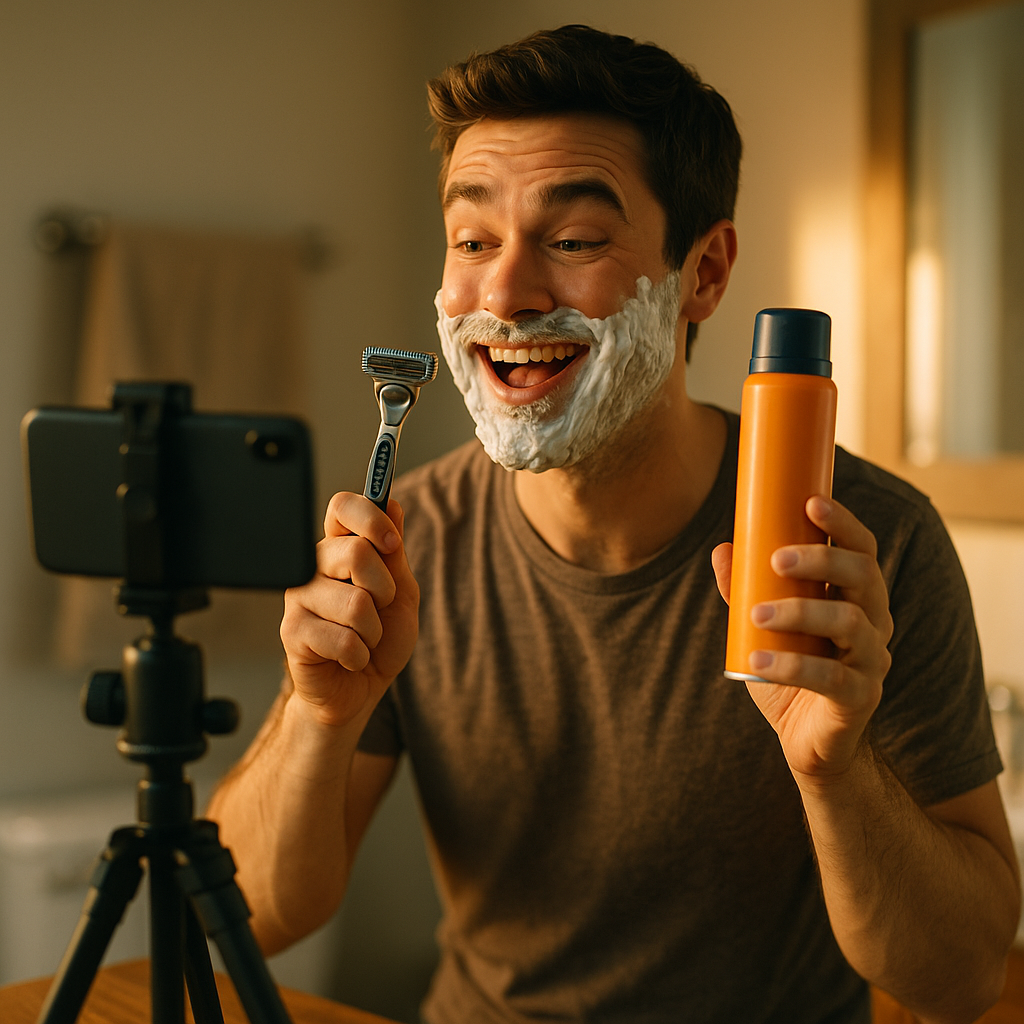How Dollar Shave Club disrupted through influencer humor has become a transformative case study for modern digital marketing. By injecting comedic flair into influencer partnerships, the brand redefined how personal care products are marketed online. But what exactly set Dollar Shave Club’s influencer humor strategy apart—and why did it resonate so deeply with audiences? Let’s break down their game-changing approach.
The Rise of Dollar Shave Club’s Humorous Influencer Marketing
Dollar Shave Club’s ascent in the grooming industry was fueled by an innovative content strategy built around influencer humor. Instead of traditional endorsements, the brand collaborated with influencers who were authentic, relatable, and most importantly—funny. Their first viral video, powered by CEO Michael Dubin’s comedic delivery, paved the way for partnerships with digital creators who shared a similar irreverent style.
Research from Statista in 2025 shows that 68% of Millennials prefer brands partnering with comedic influencers over traditional ads. Dollar Shave Club realized early on that humor could bridge the gap between brand and consumer, disarming skepticism and building trust faster than conventional messaging. This strategy set them apart in a crowded subscription box marketplace.
Building Brand Trust With Authentic Influencer Partnerships
The brand’s use of humor wasn’t random. Dollar Shave Club carefully selected influencers, often stand-up comics or popular YouTube personalities, whose voices matched the brand’s irreverent tone. These partnerships blurred the lines between advertising and entertainment.
- Authentic Storytelling: Influencers openly shared their grooming mishaps and “real guy” moments, making recommendations feel like genuine advice—not a sales pitch.
- Transparency: Dollar Shave Club ensured all paid partnerships were disclosed, reinforcing trust with their audience in accordance with FTC guidelines updated in 2025.
- Mutual Benefit: Influencers gained creative freedom, while the brand reaped the benefits of organically viral content.
According to a Nielsen Trust in Advertising survey, consumers are 74% more likely to buy from brands that leverage genuine influencer relationships over scripted celebrity endorsements. Dollar Shave Club’s humor-driven approach proved both effective and scalable.
Leveraging Humor for Social Media Virality
In 2025, social media feeds are overloaded with branded content, making it difficult for companies to stand out. Dollar Shave Club cracked the code by infusing humor into every campaign, encouraging shares and sparking conversations. Their most shared campaign—“Shave Time, Shave Money”—featured punchy quips and cheeky product demos that became memes overnight.
The brand used platforms such as TikTok, Instagram, and YouTube for their influencer collaborations:
- Short, Snappy Videos: Humorous skits showing bad shaving experiences and Dollar Shave Club’s solution captured the short attention spans of users.
- Meme Culture: Influencers created relatable memes with branded tags, looping Dollar Shave Club into everyday online humor.
- User Participation: Fans were invited to submit their own funny shaving stories, turning customers into mini-influencers and extending campaign reach.
The result? According to BuzzSumo, Dollar Shave Club secured a 25% higher share rate in humor-driven influencer campaigns compared to industry benchmarks in 2025.
The Economics of Influencer Humor: ROI and Growth
Humor isn’t just for laughs—it drives actual results. Dollar Shave Club’s witty influencer collaborations delivered measurable ROI, with lower acquisition costs and higher customer retention rates. The subscription model benefited directly from the viral nature of humorous influencer content, enabling rapid scaling with minimal media spend.
- Lower CPAs: Cost-per-acquisition dropped 34% during humor-centric campaigns due to organic traffic and word-of-mouth referrals.
- Improved Retention: Subscribers who engaged with humorous influencer content showed 27% longer average lifespans, according to the brand’s internal analytics.
- Brand Loyalty: Customers felt emotionally connected to both the influencer and the brand, leading to more repeat purchases and positive reviews.
Industry analysts note that Dollar Shave Club’s ROI was consistently higher in campaigns where influencer humor was front and center, especially in the 18-35 demographic—a critical cohort for grooming product growth.
Lessons for Brands: Adopting Influencer Humor in 2025
Dollar Shave Club’s journey offers valuable takeaways for brands aiming to adopt influencer humor:
- Align Brand Personality: Choose influencers whose comedic style aligns with your core values and target audience sensibilities.
- Prioritize Authenticity over Perfection: Audiences crave authenticity—allow influencers the freedom to embrace their quirks and share relatable anecdotes.
- Encourage Engagement: Involve the audience with humor challenges or UGC (user-generated content) contests to extend campaign reach.
- Measure and Iterate: Track share rates, engagement, and sentiment closely to continuously refine your humor-based influencer strategy.
Dollar Shave Club not only disrupted their own category—they built a blueprint for using humor-driven influencer marketing to foster loyalty, drive viral growth, and turn brands into household names in 2025.
FAQs on How Dollar Shave Club Disrupted Through Influencer Humor
- Q: What made Dollar Shave Club’s influencer marketing strategy unique?
A: The brand leveraged humor through carefully chosen influencers who felt authentic and relatable, transforming sponsored content into entertainment that built trust and virality. - Q: How did humor impact Dollar Shave Club’s customer retention?
A: Humorous, value-driven campaigns led to longer subscription durations and increased brand loyalty, compared to brands relying only on traditional ads. - Q: Can smaller brands replicate this influencer humor strategy?
A: Yes—with the right influencer partnerships, any brand can use humor to foster audience connection and achieve scalable growth, as long as it aligns with their values and audience preferences. - Q: Is influencer humor still effective in 2025?
A: Absolutely. With today’s ad-savvy consumers, humor remains a top driver of engagement and organic sharing across all major social platforms. - Q: How can brands measure the ROI of humorous influencer campaigns?
A: Brands should track metrics such as engagement rates, share rates, acquisition costs, and retention rates to assess the effectiveness of campaigns built around influencer humor.
Dollar Shave Club’s disruption through influencer humor is a masterclass in authentic, effective marketing. By aligning comedic influencers with their irreverent brand identity, they created viral content that built trust and loyalty. The clear takeaway: bold, humorous influencer partnerships can fuel exponential growth for brands ready to embrace creativity in 2025.
